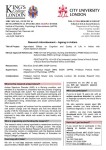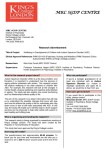 Ageing and Autism Spectrum Disorders
Ageing and Autism Spectrum Disorders
We have been approached by Professor Franscesca Happe regarding two research projects that she is involved with. One around adults with Autism Spectrum Disorder and one around grandparents of children with Autism. Professor Happe is trying to pioneer research into adults with Autism which as we all know is a much neglected area.
Abstract
The planned work aims to investigate age-related changes in neurocognitive profile in older adults with autism spectrum disorder (ASD). Remarkably little is known about ageing in ASD. Given the lack of research in this area, the present study has primarily exploratory aims, although a tentative hypothesis of improved social cognition with age will be tested. Two main approaches to the topic are planned:
(i) A sizable cohort (N=40-50) of older (age 50+) and younger adults (aged 20-30) with ASD and a smaller comparison group (N~50) of typically developed adults will be recruited. Autism symptoms, additional psychiatric disorders, cognitive skills (e.g. theory of mind, executive functions, and central coherence), and quality of life will be investigated. Analyses will include comparison of younger and older groups with ASD and controls, and correlations with age across the groups. We aim to explore how mental health and wellbeing relate to core cognitive features of ASD in young and old groups.
(ii) To study the characteristics and quality of life and wellbeing of a group of elderly people high in autistic traits, we will collect data by post from grandparents of children diagnosed with ASD. Given the substantial heritability of ASD and related traits, this group is expected to be enriched for the ‘broader autism phenotype’. A group of (N=150-250) grandparents (likely age range 50-85) of individuals with ASD will be sent postal questionnaires and tasks measuring autistic-like traits, quality of life, cognitive skills (e.g. social cognition). Grandparents with high and low autistic traits will be compared, and relationship between measures and correlations with age will be explored.
Anything you need to understand the projects, and indeed if you wish to then consent to being part of them, are on the attached documents below.
[half]Study One Advertisement

![]() Here is the advert in PDF format
Here is the advert in PDF format
and a link HERE to the Patient Information leaflet.
[/half] [half]Study Two Advertisement

![]() Here is the advert in PDF format
Here is the advert in PDF format
and a link HERE to the Patient Information leaflet.
[/half] Share This Post:







Leave a Reply